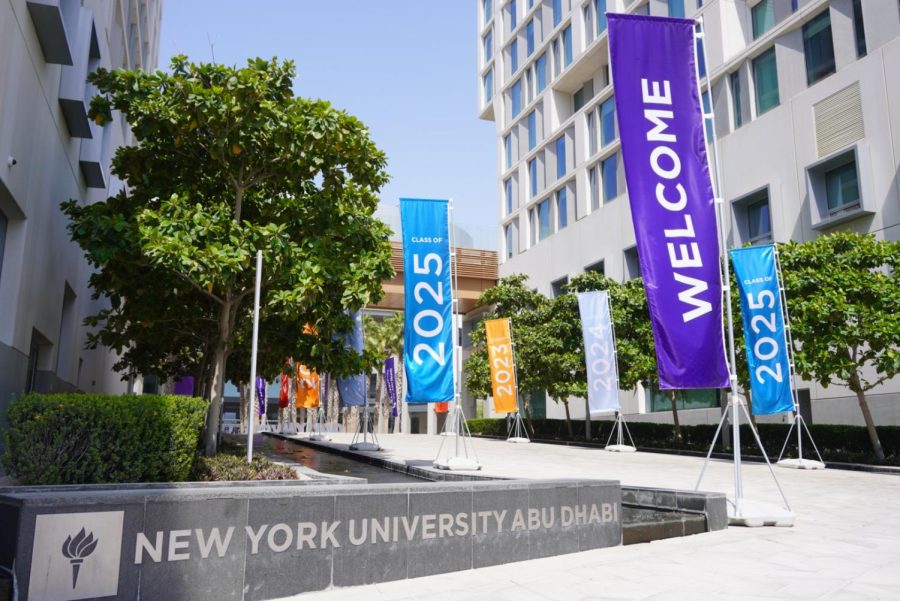Opinion: NYU must take a stand for academic freedom abroad
Multiple NYU study-away sites have been forced into academic censorship. Enough is enough.
Ties with the United Arab Emirates hamper freedom of academic expression at NYU’s Abu Dhabi campus. (Staff Photo by Roshni Raj)
February 14, 2022
Our university’s torch logo should symbolize academic freedom and justice. Instead, it has come to stand for unfettered capitalism — selling out academic freedom to pad an international real estate portfolio.
By far, the most egregious example of the university’s cowardice in standing up for basic freedoms resides in NYU’s Abu Dhabi campus — a campus reported to have been built on the back of forced labor. In the United Arab Emirates, a nation where the kafala system exploits thousands of unpaid, unfree workers, it should come as no surprise that at NYU’s state-sponsored Abu Dhabi campus, academic freedom is an afterthought.
Six years ago, the situation of academic censorship came to a somewhat dramatic head at Kennedy International Airport when CAS professor Andrew Ross attempted to board a flight to Abu Dhabi to conduct research in the UAE. He was met by customs officials who notified him that he had been banned from the UAE for “security reasons.”
As a former student of Ross, who teaches an excellent and insightful course called “Work, Labor, and Power,” I can assure you that Ross is no international terrorist. He is, however, a stalwart advocate and researcher on labor issues in the UAE.
When Ross was banned from the country for daring to look into the plight of the kafala wage slaves, the university’s then-president John Sexton didn’t fight to reverse Ross’ ban. He sat by silently as Loren Berger, a New York private investigator with ties to the UAE, surveilled and dug up dirt on Ross. A spokeswoman for the UAE’s embassy declined to comment on the investigation.
When given an inch, the UAE took a mile.
In 2017, the regime went further, banning two Iranian NYU professors under the pretext that they, too, posed a threat to the UAE’s national security. Mohamad Bazzi and Arang Keshavarzian, who believe they were banned because of their Shiite faith, have called on NYU to condemn the country’s visa policies and subsequent assault on academic freedom. Instead, former NYU Abu Dhabi spokeswoman Kate Chandler wrote to WSN with the unconscionable suggestion that the NYU community should simply accept these intrusive policies because the Abu Dhabi affair is a “success that NYU can and should be proud of.”
Chandler, who now has her own public relations firm, worked full-time at NYU to suggest moral ambiguity where there is none. The policies of the UAE do not permit basic freedoms, let alone academic freedom.
In Hamilton’s response to Bazzi and Keshavarzian’s 2017 ban, he simply addressed how the university would notify professors of their ban from the country — not the real “question mark,” as Ross put it, that hangs over NYU Abu Dhabi today: Can academic freedom really exist under the totalitarian conditions of the UAE?
NYU’s Arthur L. Carter Journalism Institute answered this question for itself, arguing that academic freedom is not possible given the conditions of censorship in the UAE. After Bazzi and Keshavarzian’s ban in 2017, the journalism department voted unanimously to boycott the country until the issue was satisfactorily resolved.
A larger question mark hangs over not just NYU’s presence in Abu Dhabi, but also over the university’s commitment to academic freedom at large. At NYU Shanghai, the university’s other foreign degree-granting campus, many have raised questions about the Chinese government’s influence over the curriculum. As Vice reported in 2019, the campus maintains a “Civic Education” course that is not listed on the NYU Albert class registry and is not taught by an NYU faculty member. This course is, however, mandatory for the Chinese citizens of NYU Shanghai; its syllabus includes lessons such as “Promoting the Prosperity and Development of Socialist Culture with Chinese Characteristics.” With regard to NYU’s campus in Tel Aviv, the economic and technological capital of Israeli apartheid, university spokesman John Beckman ignorantly suggested that members of the NYU community who support the boycott, divest and sanctions movement against apartheid were behaving in a manner “deeply at odds with NYU’s non-discrimination policies.
For university leadership, the global operations of NYU are more about making money than about free study and research across the world. In a financial document, Executive Vice President Martin S. Dorph boasted that “overall, the global network generates more revenue than expense.”
The NYU community should ask itself: Are we OK with having leaders who have proven so eager to sell out our academic freedoms for another international real estate deal? While it is ultimately a good thing that the university’s students can study away at such a wide array of global sites, it doesn’t serve the interests of higher education to evaluate these sites from solely a revenue-based perspective. NYU’s leadership ought to make it clear to the authoritarian countries of the world that, even if it costs the school millions of dollars and forces entire academic centers to shut down, they won’t allow NYU’s iconic torch to be snuffed out.
Contact Zach Banks at [email protected].



























































































































































